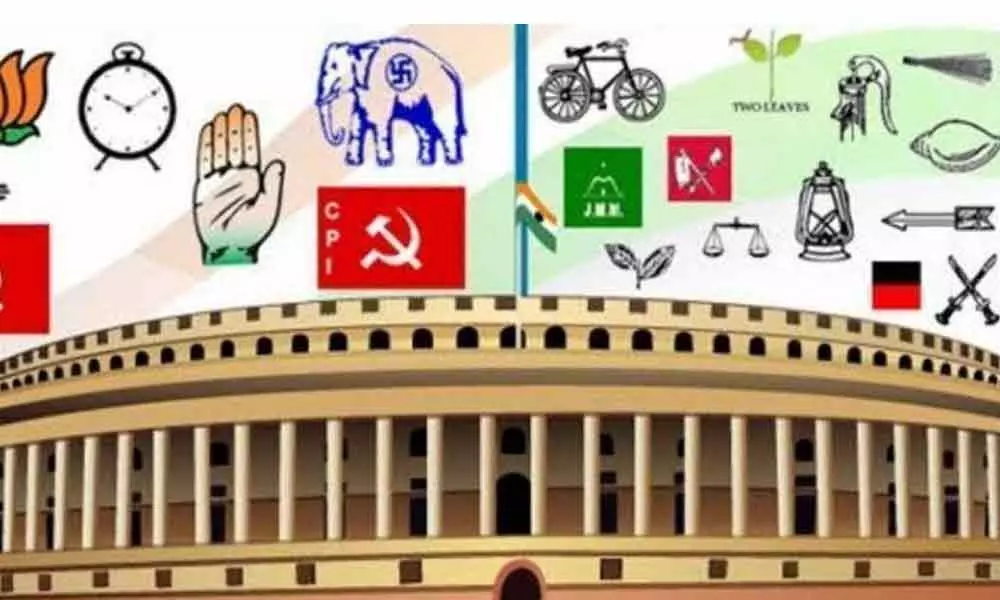Our politics is rotten

The proliferation of money and muscle power in Indian politics continues to undermine our democracy.
The proliferation of money and muscle power in Indian politics continues to undermine our democracy. This fact has been reiterated by the Vice President of India M Venkaiah Naidu on Thursday.
The Vice President was candid in his observation when he said that all political parties are resorting to "Caste, Community and Criminality." This is something that needs to be viewed seriously.
Using the concept of three 'C's as mentioned by the Vice President is a common phenomenon in all the political parties, whether it be a national party or a regional or even sub regional parties.
It is a well-known fact that only criteria for giving ticket to a candidate whether it be the local body elections or Lok Sabha elections is that he should be a winning horse.
But what are the qualities a winning horse should have? In the words of the Vice President, the candidates should have character, calibre, capacity and conduct. But here in the name of selecting a winning horse, the political parties opt for caste, community and criminality.
This formula has brought the country to a stage where the political system has started going haywire. More and more of authoritarian tendencies are creeping into the parties that come to power.
"What we say is right, what we do is correct," is the attitude that is seen everywhere.
Even in case of financial management plans are drawn for a period of five years but to remain in power, plans are being drawn for a period of 20 years.
The parties are losing vision for development the state and are busier hiring strategists to be in power for at least 20 years.
In a recent speech, Prime Minister Narendra Modi said that political intervention is necessary for democracy. But then the big question is who is destroying the democracy?
The people or the political parties? In the past too in this column, we had questioned as to who would bell the cat? While the statement of the Prime Minister is welcome, the fact is who will take measures to bring in intervention. Is the government planning to come up with reforms in electoral system?
It is generally said that charity begins at home. So will the ruling party at centre start the process of cleansing the party of criminal elements?
Is it not a fact that around 35 per cent of the elected representatives have criminal cases against them and is it not a fact that many of the offences are of serious nature.
While some are heinous crimes like extortion, some pertain to economic offences. What is more tragic is that many cases do not see the light of the day as the party in power covers up the crime and sees that the cases are withdrawn. In this regard, nearly all political parties are equal offenders.
The biggest political intervention to save democracy would be to ensure that law does not shy away, and action is taken against all those who are facing cases irrespective of the parties they represent.
Getting elected as law makers should not give them immunity from law. But the trillion-dollar question is, are our leaders ready for such drastic reform.
If the centre can show its courage by this single political intervention, it would be a much major step than what we had seen in the form of surgical strikes and doing away with article 370 in J&K.
The former Chief Election Commissioner Navin Chawla in one of his analysis in his book 'When Crime Pays: Money and Muscle in Indian Politics' observed that in Himachal and Gujarat Assembly elections out of 338 candidates who contested, 22 had cases against them and more than two thirds of those candidates who won with criminal records were crorepatis.
The political parties duck under the guise that till the case was proved in a court of law they cannot be called as criminals. They also find it easy to tag them as winning horses and give tickets since such candidates bring in their own finances.
Well there are people who may argue that why do people then vote for such criminal elements. Well in India those who give lectures on moral values do not go out to cast their vote. It is the poor and the rural population who utilise their franchise.
The self-financing candidates use all kinds of tactics to lure the voters. The gullible voters fall prey to such allurements and the self-financing candidates become law makers.
They promise to give everything free to the voters. Neither they nor the political parties do any pre-poll exercise to evaluate the impact of such freebies on the economy. The short-term goal is win by hook or crook. The irony is all these crorepatis talk about corruption free government.
Caste and religion too play a major role in Indian politics. The candidates do not hesitate to offer everything and promise anything to see that a caste or community votes in their favour.
Booth capturing was one way of exhibiting muscle power by political parties but some macro level reforms taken up by the Election Commission like introduction of EVMs has reduced this menace to a great extent.
However, people have found out a new mode of rigging. There are any number of allegations during the elections that officials were resorting to making the innocent rural voters who are not so conversant with technology to press the button in favour of a different candidate.
To check this VVPATs were brought in so that the voter can see whether his precious vote has been cast properly or not. But here too in the name of technical errors, many problems were arising.
It is not that the successive governments did not take any measures to curb malpractices or bring in reforms. The Election Commission tried to counter the illegal usage of money by increasing the number of observers in each constituency from one to 10. But newer methods are being found to hoodwink the observers.
Things can be rectified if the political parties can show the courage to stop encouraging criminals. The stock reply given by all parties before elections is, if questioned is that this time they had weeded out many such people. But no party is in a position to say that they are 'Criminal Mukt' parties.
The people too should understand that falling prey to allurements was harming them. Once elected, the focus of all such people would be to earn for next elections and development goes for a toss.
The governments once in power struggle to implement the promises as the revenue would not grow as required. Finally, the economy suffers and ultimately it is the people who become victims of the freebies offered by the parties.
The opposition tries to play on failure of the delivery system and promises more than what the existing ruling party had done in last elections and the vicious circle continues.
What is more required today to save democracy is the intervention of people rather than political intervention. The people should learn to think about long term benefits rather than few thousands they get for their vote or some liquor or other such small gifts.
Unless people wake up and realise that they are the real saviours of democracy things will not change as no party in power would think of any intervention to change the system, as they fear that they may lose elections.










